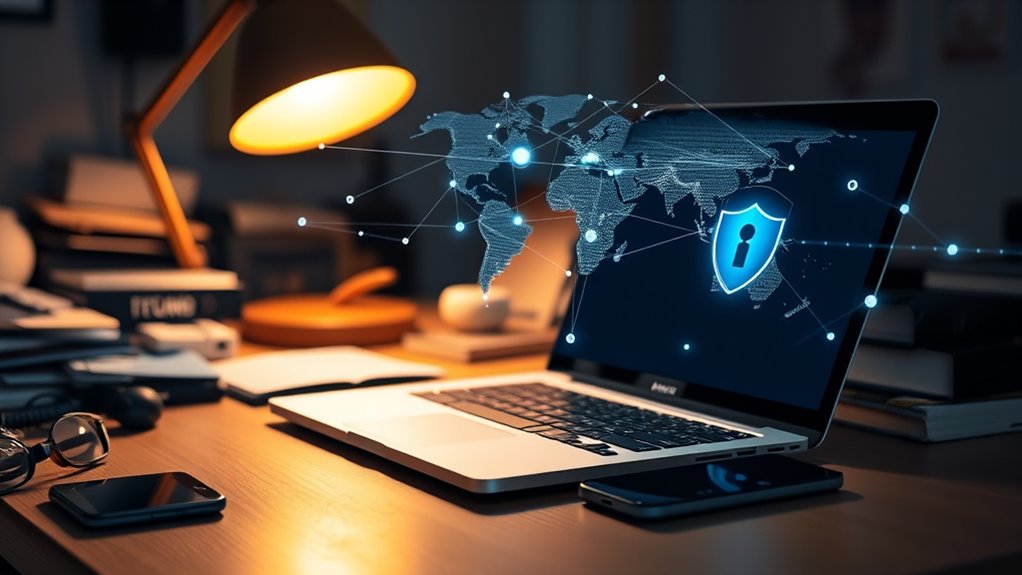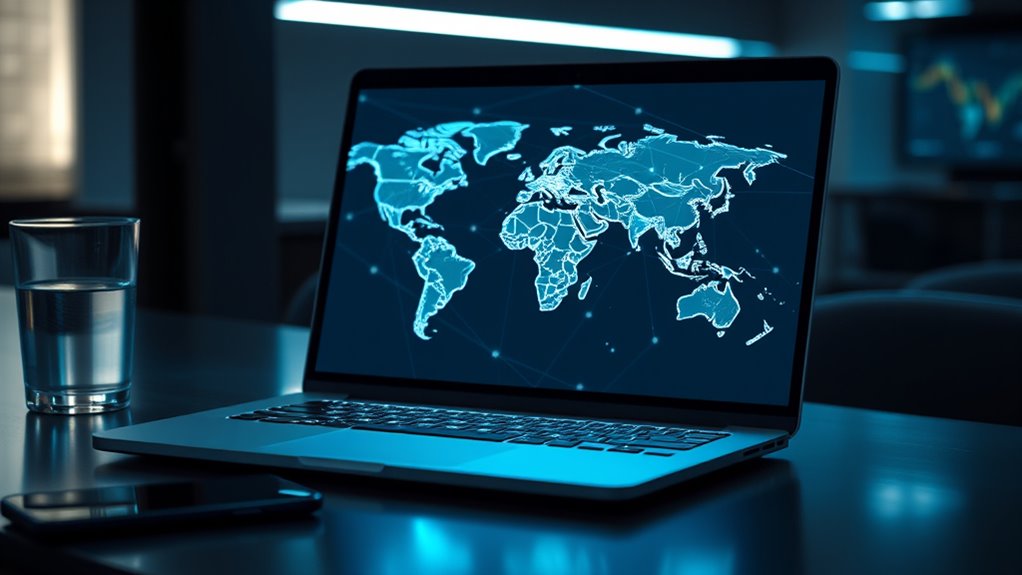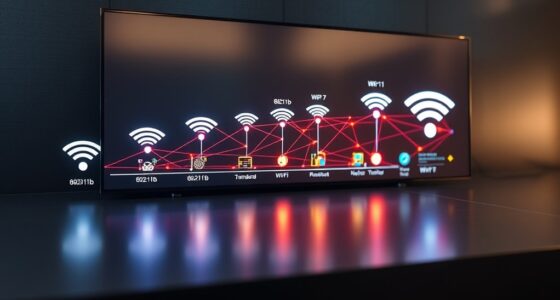A VPN creates a secure, encrypted tunnel between your device and a remote server, protecting your online activities from hackers, government agencies, and your internet provider. Use one whenever you’re handling sensitive information, connecting to insecure Wi-Fi, or trying to access region-restricted content. It also helps safeguard your privacy and reduce online tracking. If you want to understand more about how a VPN works and when it’s most useful, keep exploring these benefits.
Key Takeaways
- A VPN creates a secure, encrypted connection between your device and the internet to protect your privacy.
- Use a VPN when accessing sensitive information like banking, work accounts, or personal data.
- It helps bypass regional restrictions and access geo-blocked content from anywhere.
- VPNs secure your connection on unsecured Wi-Fi networks, preventing hackers from intercepting data.
- They enhance online privacy by masking your IP address and preventing tracking by third parties.

A Virtual Private Network (VPN) is a powerful tool that helps protect your online privacy and security. When you connect to the internet through a VPN, it creates a secure, encrypted tunnel between your device and the VPN server. This encryption ensures that any data you send or receive is hidden from prying eyes, whether it’s hackers, government agencies, or even your internet service provider. VPN security is vital because it minimizes the risk of data theft and online tracking, giving you peace of mind when browsing, shopping, or working online.
A VPN creates a secure, encrypted tunnel to protect your online data from hackers and trackers.
However, one common concern with using a VPN is its impact on VPN speed. A good VPN service balances strong security measures with minimal impact on your internet speed. While some VPNs can slow your connection due to encryption overhead or server distance, many providers optimize their networks to deliver fast, reliable performance. This means you can enjoy secure browsing without sacrificing much in terms of speed, whether you’re streaming videos, gaming, or conducting video calls. Opting for a VPN with high VPN speed ensures you don’t experience frustrating delays or buffering, which can be especially important if you use the internet heavily for work or entertainment.
Knowing when to use a VPN is just as important as understanding what it does. You should turn on your VPN whenever you’re accessing sensitive information, such as online banking, shopping, or logging into work accounts. Using a VPN in these situations helps prevent hackers from intercepting your data, especially on unsecured Wi-Fi networks like those in cafes or airports. Additionally, if you’re traveling abroad and want to access content that’s region-restricted, a VPN can help you appear as if you’re browsing from your home country, bypassing geo-blocks and censorship.
Another key time to use a VPN is when you’re concerned about online tracking and privacy. Many websites and advertisers track your online activity to serve targeted ads or build profiles on you. A VPN masks your IP address, making it harder for third parties to monitor your browsing habits. This added layer of privacy is especially valuable if you’re concerned about government surveillance or data collection by corporations. Furthermore, using a VPN can help you access industry-specific content that might be restricted in certain regions, enhancing your online freedom and security.
Frequently Asked Questions
Can a VPN Improve My Internet Speed?
A VPN can improve your internet speed if your ISP intentionally slows your connection through throttling. By using VPN encryption and IP masking, it hides your activity from your provider, potentially preventing throttling. However, VPNs can sometimes slow your speed due to encryption overhead. So, while a VPN might help in some cases, it’s not guaranteed to increase your internet speed and depends on your specific situation.
Is Using a VPN Legal in My Country?
In most countries, using a VPN is legal, with over 65% of internet users worldwide employing one for privacy. However, you should check local laws because legal restrictions and privacy laws vary. Some nations ban or heavily regulate VPNs, so it is crucial to confirm if your country permits their use. Staying informed helps you avoid legal issues while enjoying the privacy benefits a VPN offers.
Will a VPN Protect My Online Banking Activities?
A VPN can enhance your banking security by encrypting your connection, making it harder for hackers to intercept your data. While it doesn’t guarantee complete protection, the encryption benefits provided by a VPN add an extra layer of security during online banking. Using a VPN, you reduce risks associated with public Wi-Fi and unsecured networks, helping you keep your financial information private and safe from potential cyber threats.
How Does a VPN Affect Streaming Service Access?
A VPN helps you access streaming services by bypassing geo restrictions, allowing you to enjoy content not available in your location. When you connect to a VPN server in a different country, you can open a wider range of shows and movies, expanding your content access. Keep in mind, however, some streaming platforms detect VPN use and may restrict access, so choose a reliable VPN for smoother streaming experiences.
Can a VPN Prevent All Types of Online Tracking?
You can’t stop all online tracking, but a VPN helps you stay hidden. Remember, “a chain is only as strong as its weakest link.” While a VPN masks your IP and encrypts data, tracking cookies and ad blockers can still monitor your activity. Using both alongside a VPN boosts your privacy, but nothing guarantees complete invisibility online. Staying vigilant and combining tools is your best bet.
Conclusion
Using a VPN can markedly boost your online privacy and security, especially when accessing public Wi-Fi or bypassing geo-restrictions. While some believe VPNs are foolproof, they aren’t invincible—technologies like VPN blocking and advanced tracking can still compromise privacy. Still, when used wisely, a VPN offers a valuable layer of protection. Remember, no tool guarantees complete anonymity, so stay informed and combine VPN use with good online habits for the best results.









